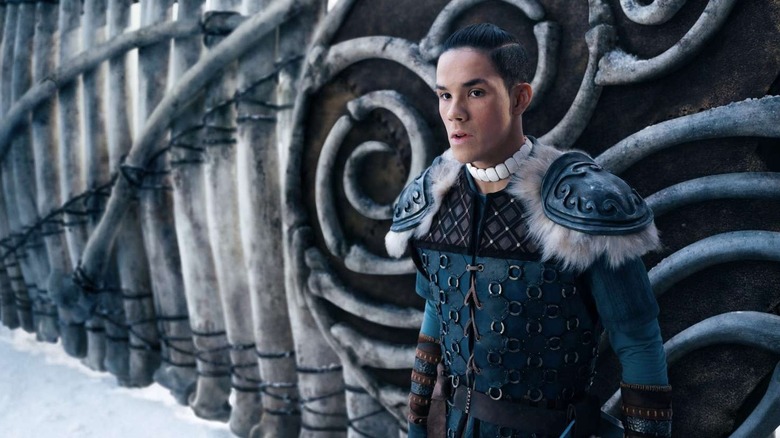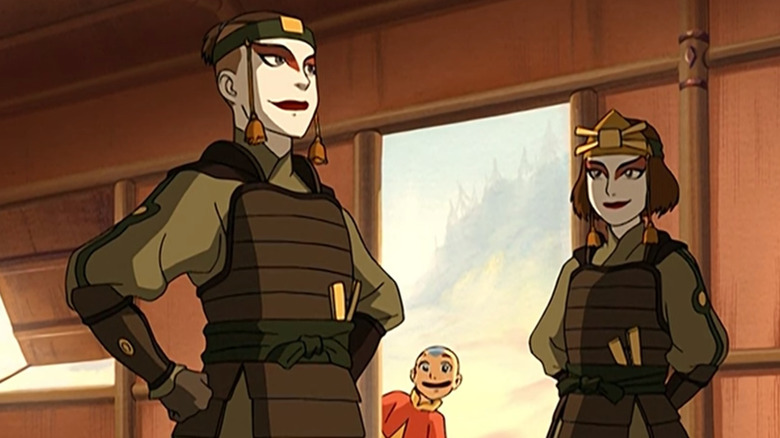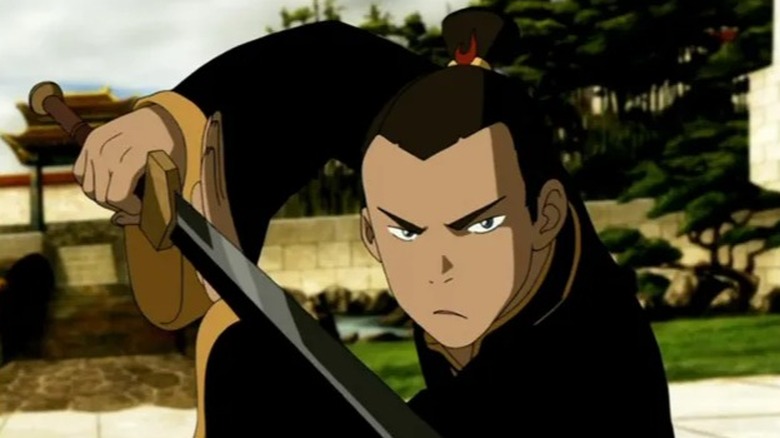The Live-Action Avatar: The Last Airbender Series Removes One Of Sokka's Major Character Traits
"I feel like we also took out the element of how sexist [Sokka] was. I feel like there were a lot of moments in the original show that were iffy," said actor Kiawentiio, speaking to Entertainment Weekly about the upcoming live-action remake of "Avatar: The Last Airbender" (Kiawentiio plays Sokka's younger sister Katara; Ian Ousley plays the man himself). She's right that Sokka's behavior is iffy... but that was the whole point.
Sokka is raised in the Southern Water Tribe, a patriarchal culture. The men of his village left to go fight against the attacking Fire Nation, leaving him "in charge" of the women and children. He's a chauvinist because he's been raised to be, but the show takes him down to size again and again and demonstrates why his attitude is wrong.
The opening minutes of the show's premiere, "The Boy in the Iceberg", features Sokka belittling Katara and her waterbending and she calls him a sexist in response. When Sokka tries to be a warrior to defend his village against the invading Fire Nation Prince Zuko, he gets swatted away. Simply being a man doesn't make him strong.
The turning point comes in "Avatar" episode 4, "The Warriors of Kyoshi." Team Avatar travels to Kyoshi Island. Sokka meets Suki and her Kyoshi Warriors, women who wear their femininity on their sleeves with green dresses, fans, and make-up. When Sokka tries to show them up, he's humiliated. He respectfully asks to be trained by them and he's required to wear their uniform during the lessons. The whole episode is about Sokka learning he was wrong to think women can't be great warriors; he's put in a girl's position and realizes that position is nothing to be ashamed of.
Removing Sokka's early sexism guts this character arc.
Sokka and the Kyoshi Warriors
"Avatar" is a children's show, but a smart one that treats its young audience with respect. As an action cartoon inspired by shōnen anime that aired on Nickelodeon, it would especially appeal to boys. Sokka's arc teaches them sexism is wrong and feminity isn't a weakness in an organic way. It's not subtle to an adult's eye, but for kids, seeing a character who they like learn a lesson in stages will stay with them more than a simple lecture. Plus, a boy wearing a dress and not being treated as a punchline? That's a pretty progressive statement on gender for 2005.
Of course, "Avatar: The Last Airbender" has many female fans too. My colleague (and "Avatar" super-fan) Valerie Ettenhoffer has testified that Katara calling Sokka out in "The Boy in the Iceberg" was probably the first time she'd ever heard of sexism. Seeing female characters like Katara and Suki be unafraid to stand up against belittling treatment from men is just as valuable a lesson for girls.
Ousley (also interviewed by Entertainment Weekly) agreed with Kiawentiio and said, "There are things that were redirected just because it might play a little differently [in live-action]." I feel this notion that a heroic character can't be seen as unsympathetic by the audience is part of a worrying trend. Many still fail to grasp the idea that depiction is not an endorsement; it should be especially obvious in Sokka's case that the show only endorses him changing his sexist ways. People demand media be shaped to fit their personal moral compass so they can feel superior for consuming the "right" kind of art.
Redemption in Avatar: The Last Airbender
Those same righteous fans also like to throw cold water on fictional villains' face turns (I see Darth Vader's turn back to the light in "Return of the Jedi" contested a lot), framing the process of personal growth as an accumulation of goodness points that can never be completed. Many people are unwilling to empathize with characters whose actions reflect poorly on them. Creators are responding by sanding off those edges, even for the bad guys. The storytelling results are simply unsatisfying.
This is especially ridiculous for "Avatar: The Last Airbender," a story with redemption at its core. Zuko (played in live-action by Dallas Liu) goes from villain to hero after a lot of introspection. But before he gets to be a hero, he does plenty of bad things too. He repeatedly threatens the heroes with mortal harm while pursuing them. In "The Cave of Two Lovers," he steals a horse from a family that fed him. In "The Crossroads of Destiny," he helps the Fire Nation finish its conquest of the Earth Kingdom. Zuko's journey wouldn't be worth following if he weren't bad at the start. Redemption means nothing if you have no sins to make up for, yet a genuine desire to be better is all it takes.
As for Sokka, his character development carries on from "The Warriors of Kyoshi." He's never sexist again; he and Suki even get together, because by becoming a man who respects women, she can respect him in turn. In the season 3 episode "Sokka's Master," he trains with the swordsman Piandao, who only takes Sokka as a student because of his humility — that humility started with him unlearning toxic masculinity.
If you never fall, it's even harder to rise to greater heights.
"Avatar: The Last Airbender" releases on Netflix on February 22, 2024.


